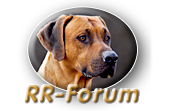Hier hab ich die Ergebnisse der Studie von Herrn Jonathan Smith (johnsmid@hotmail.com) bekommen. Vielleicht interessiert es ja den einen oder anderen...
mfg
Here is my results to date in the Rhodesian Ridgeback Longevity Study. If you have any questions, comments, or would like to know more please feel free to get back to
me. Thanks again for all your help.
Johnathan
The web based survey received 133 entries of 39 deceased and 94 living dogs. Pedigrees were retrieved for 112 of the 133 dogs. Pedigrees averaged 87%
complete to the 10th generation. The median of lifespan was calculated to be 11.4 years using all the dogs in the study in a percent survival curve.
The dogs that had deceased were studied in more detail since these dogs have a defined lifespan. The 39 deceased dogs showed a significant reduction in
longevity as the date of birth increased (R2 = 0.2532, p = 2.05 x 10-25). The average lifespan of the deceased dogs was 8.4 years and the median lifespan was 9.7
years.
Of the 39 dead dogs 35 had pedigrees extensive enough calculate Coefficients of Inbreeding (COI). These 35 dogs had an average lifespan of 8.6 years.
The initial regression analysis of longevity based on the 10th generation inbreeding coefficient in the 35 dogs was insignificant (R2 = 0.0694, p = 0.1261). However, 5
of these 35 dogs died accidental deaths. These accidental deaths provided a convenient internal control and their removal makes the regression analysis both stronger
and more significantly significant (R2 = 0.2454, p = 0.005377).
Further analysis was carried out to ensure that these results were not influenced by the completeness of the 10th generation COIs. 23 deceased dogs had 5
generation pedigrees that were 100% complete. The 5th generation COI was calculated for these dogs. A regression analysis showed that longevity was significantly
based on the 5th generation COI (R2 = 0.2048, p = 0.00604). Of these 23 dogs three had died accidental deaths. Removal of these 3 dogs showed a stronger
correlation but less significant regression analysis (R2 = 0.2316, p = 0.011).
COIs were calculated for the 112 dogs with extensive enough pedigrees to calculate coefficients of inbreeding. A statistically significant increase in COI over
time was found for these dogs (R2 = 0.0566, p = 0.0119).
Ergebnis 1 bis 1 von 1
Thema: FYI (RR Longevity study)
-
29.03.2001, 10:04 #1
 FYI (RR Longevity study)
FYI (RR Longevity study)
Aktive Benutzer
Aktive Benutzer
Aktive Benutzer in diesem Thema: 1 (Registrierte Benutzer: 0, Gäste: 1)


 LinkBack URL
LinkBack URL Über LinkBacks
Über LinkBacks



Lesezeichen